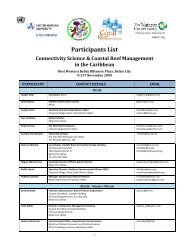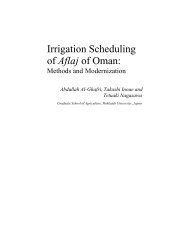The Global Water Crisis: Addressing an Urgent Security - Unu-inweh ...
The Global Water Crisis: Addressing an Urgent Security - Unu-inweh ...
The Global Water Crisis: Addressing an Urgent Security - Unu-inweh ...
You also want an ePaper? Increase the reach of your titles
YUMPU automatically turns print PDFs into web optimized ePapers that Google loves.
<strong>The</strong> Council membership acknowledged that a watershed-based approach should be pursued as a me<strong>an</strong>s of addressing<br />
the growing global water crisis. International examples suggest that watershed-scale m<strong>an</strong>agement of water resources c<strong>an</strong><br />
generate increased economic benefits en route to solving environmental problems. <strong>The</strong> Europe<strong>an</strong> Union <strong>Water</strong> Framework<br />
Directive, for example, provides a positive example of a successful agreement on water m<strong>an</strong>agement st<strong>an</strong>dards <strong>an</strong>d the<br />
linkages between agricultural <strong>an</strong>d water policies.<br />
In recognizing that there is only a finite amount of water in the world, we realize that the water we drink today is the same<br />
water we will drink tomorrow <strong>an</strong>d our gr<strong>an</strong>dchildren will drink generations from now. This necessitates the promotion of<br />
<strong>an</strong> ethic of water usage <strong>an</strong>d a realization that water is simply too valuable not to m<strong>an</strong>age appropriately.<br />
Speaking for m<strong>an</strong>y others, the former President of Argentina, Mr. Fern<strong>an</strong>do de la Rua, identified the need for a new<br />
global water ethic. Mr. Bolger of New Zeal<strong>an</strong>d noted that just as the 1960s <strong>an</strong>d 1970s promoted the Green Revolution,<br />
we now need a Blue Revolution. Solutions to the water crisis need to be sought from the perspective of development,<br />
energy, technology, international law, gender equality, migration, economic progress, public health conservation, <strong>an</strong>d the<br />
environment. It was noted, however, that presently international water leadership is virtually non-existent. <strong>The</strong> world is<br />
clearly lacking in effective hydro-diplomacy. Political will, fin<strong>an</strong>cial resources, good govern<strong>an</strong>ce <strong>an</strong>d public education are<br />
lacking. In response to this, the InterAction Council agreed to establish a p<strong>an</strong>el to address global water issues, <strong>an</strong>d will<br />
begin this work by building on the positive examples of the Singapore International <strong>Water</strong> Week, the Stockholm <strong>Water</strong><br />
Conference, the World <strong>Water</strong> Council, <strong>an</strong>d other similar initiatives.<br />
Progress is possible on the global water crisis, but it won’t be easy <strong>an</strong>d it will take time. Alleviating the world’s water woes<br />
is one of our generation’s great challenges, <strong>an</strong>d we should be working now toward fulfillment of the InterAction Council<br />
recommendations with all the intelligence <strong>an</strong>d energy we c<strong>an</strong> summon.<br />
Response from the InterAction Council on the World <strong>Water</strong> <strong>Crisis</strong><br />
Conclusions<br />
155




